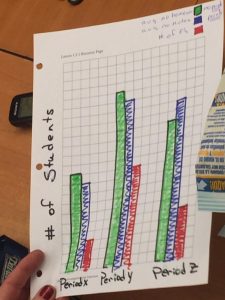100% of the Grade Based on Summative Assessments
 Theresa, middle school humanities teacher
Theresa, middle school humanities teacher
“There’s a lot of stuff I don’t put into the grade book now, but it was kind of a slow progression. At the beginning of the year I still had a homework category, but as I went through this reflection of why I’m grading and how I’m grading, this quarter I’m still assigning homework but I’m not including any homework in their grades at all. What I am doing is having a lot more of the conversation with the kids about what the purpose of the homework was. They still need to go home and they need to study and they still need to be reading independently but reminding them that I know that you did your spelling homework and studied for the spelling test if you do well on the spelling test. I know you’ve been doing your independent reading if you manage to put together a book report at the end of the month.”
Leilani, middle school math teacher
“I used to think that having grades and solely based on assessments were unfair and inequitable for students, and it hurt their confidence. I also thought that extra credit was okay if it was truly extra credit and not in lieu of something else. But now, I think that a system where it’s solely based on assessments and learning actually reflects a more accurate picture of what students know, and extra credit is unneccessary. Compared to my students last year, I think my students have a better understanding of their grades.
“And the thing that surprised me the most about all of this is how easily I was able to change my practices and how easily I realized, “This makes sense.” The other thing that was surprising is how hard it is to go back to some of my previous practices. In fact, for me right now, it’s actually impossible. I can’t get myself to actually go back and do things like grade homework now.”
Veronica, middle school Humanities teacher
“I used to count the tests for a smaller fraction because I thought that it was good teaching and fair, because there are a lot of kids don’t know how to show their thinking in the test, and they do so much work. And then I realized that it wasn’t good teaching or fair because it was distracting us from really having that deep conversation on how do I make sure I teach your type of learner, and how do I figure out how to assess your type of learner. That was a big shift to me because if somebody had told me, “Oh, I’m grading 90% on tests,” I would have thought, “You jerk!” But now I think about it totally upside down.”
